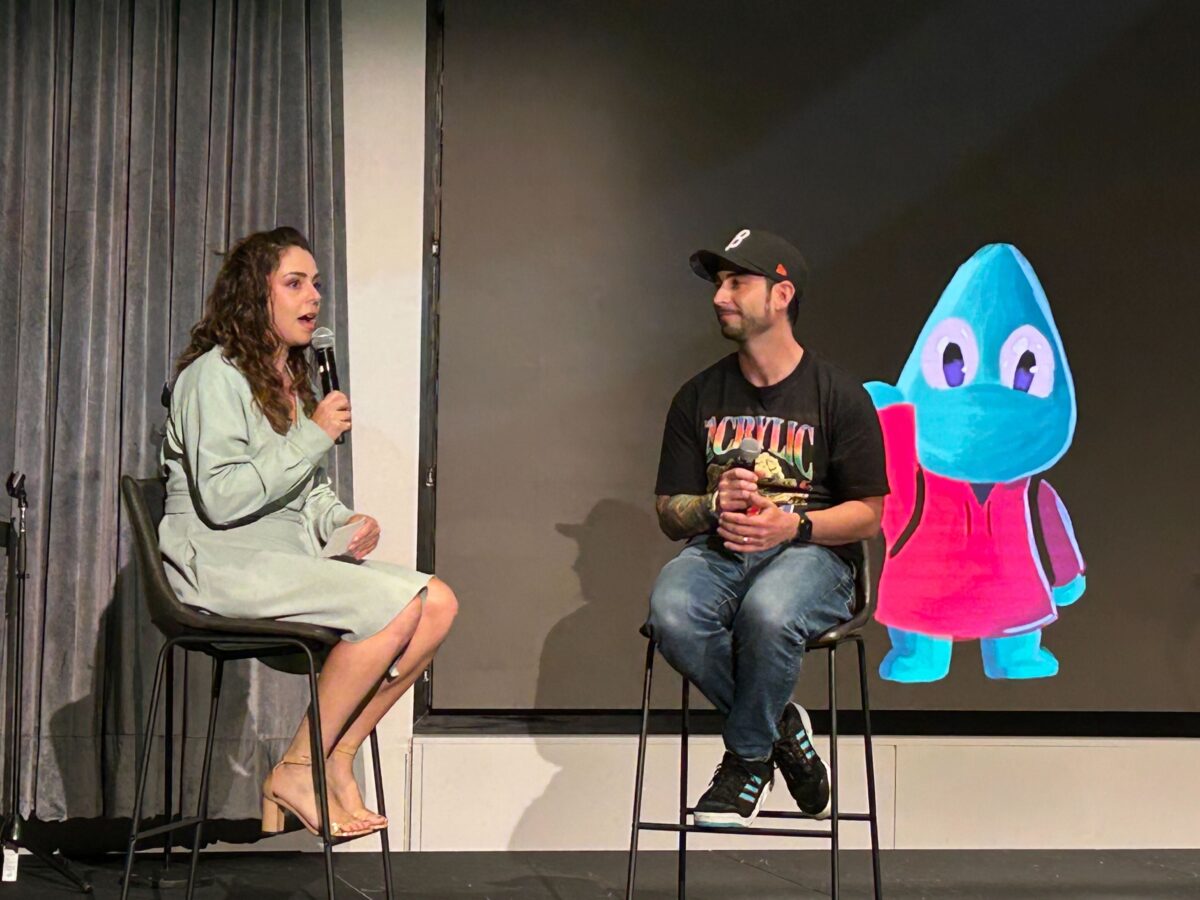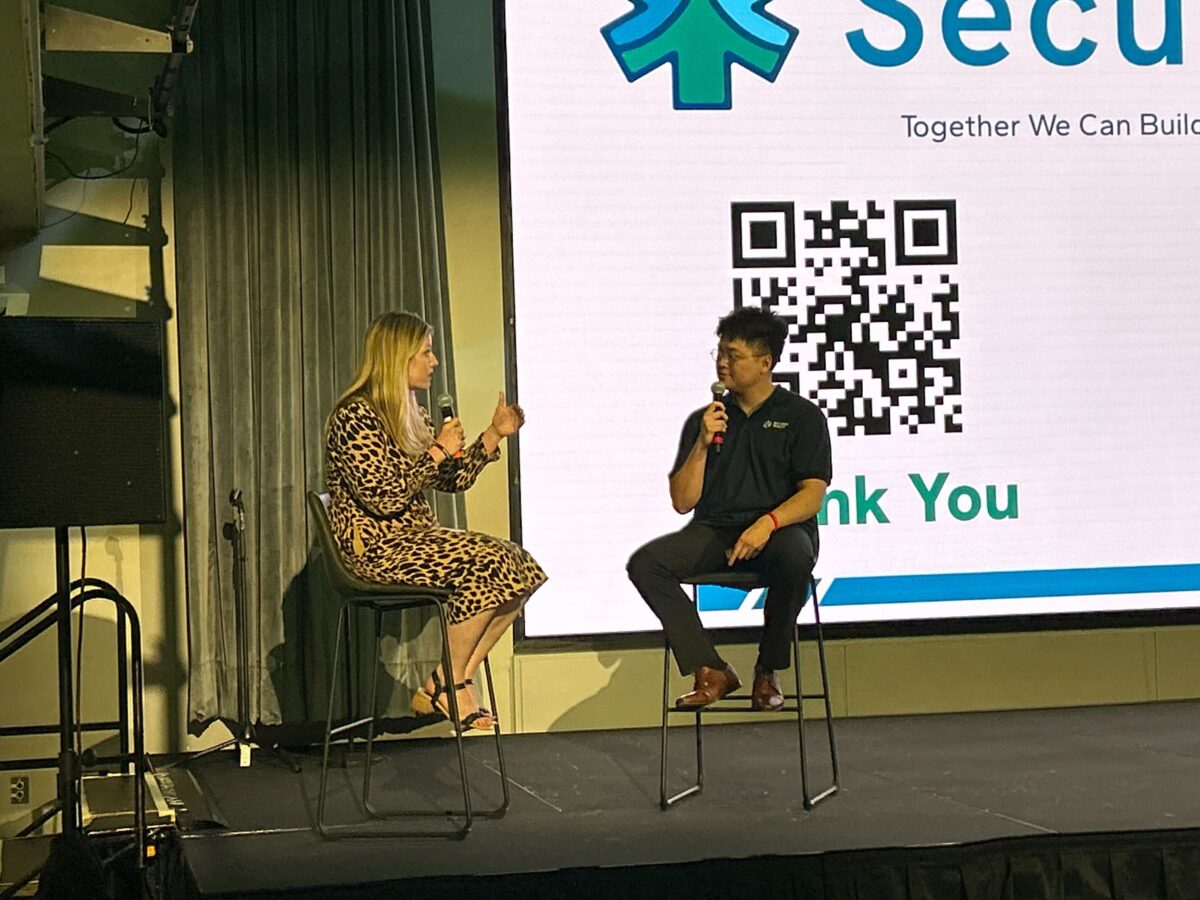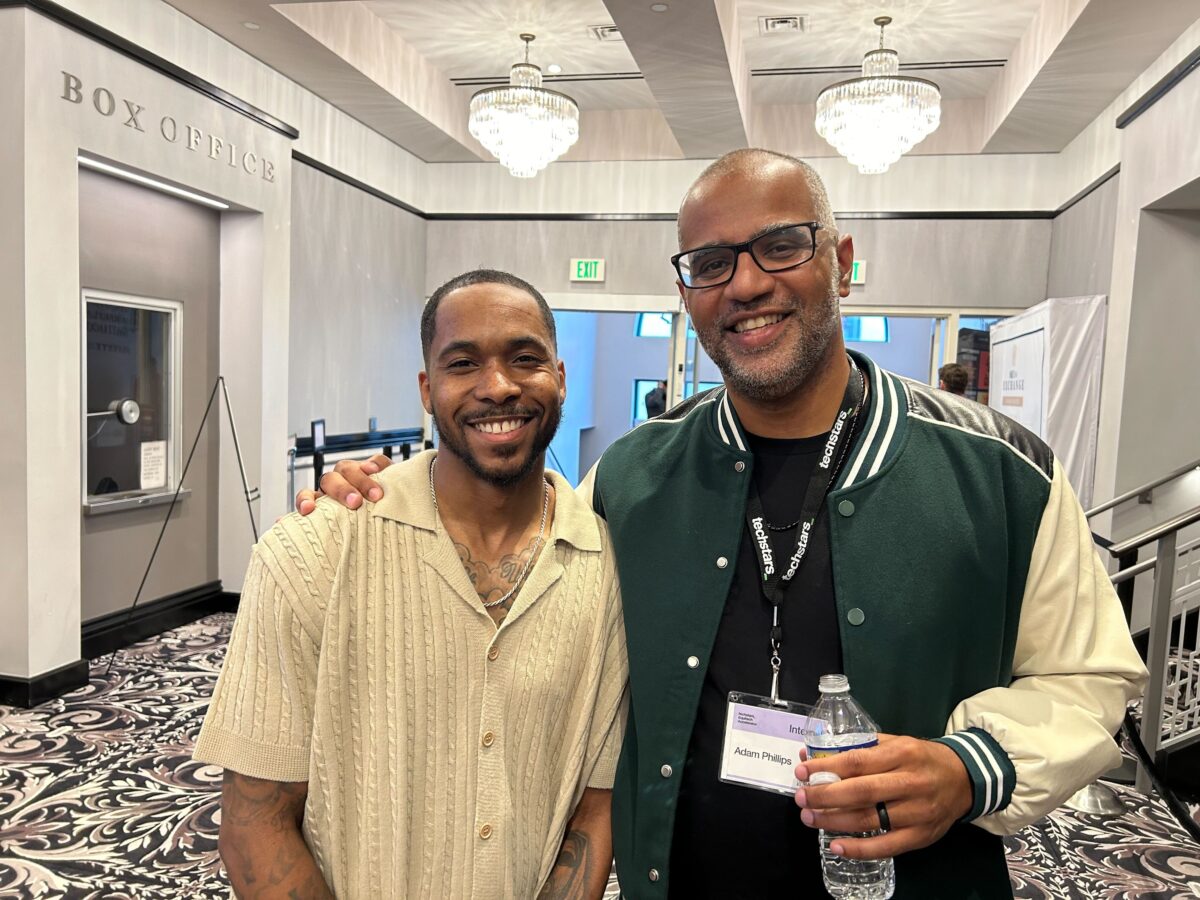The third local cohort led by the global pre-seed investor in partnership with UpSurge just wrapped, and at last week’s celebratory pitch night, several non-local founders declared their love of Baltimore and announced plans to deepen their local footprints.
The evening, hosted at the M&T Bank Exchange at the France-Merrick Performing Arts Center, featured post-pitch fireside chats that illuminated how localized entrepreneurship programs — like the ones Techstars operates around the world — can act as two-way streets: They connect companies aiming to grow with ecosystems eager to expand.
Lydia Ofori of Plainr is one of the founders who leaned into that connection.
At the event, the native Londoner and longtime finance professional, who lived in New York when she started the accelerator, revealed her company is now headquartered in Baltimore.
“Over the three months of the course, as I become entrenched in the community and as we started reaching out to private equity firms here on the ground,” Ofori said during her chat with investment advisor Laurie Felker Jones, “it became very clear to us that this is the city to build from.”
Plainr’s core platform helps private equity firms and their portfolio companies generate business insights and intelligence. Ofori told Felker Jones she saw an opportunity to build within Baltimore’s lesser-known private equity sector.
“We appreciate our early adopters and are very very fortunate to have them,” Ofori said, referring to firms that conducted paid pilots with the company. “However, we also recognize that Baltimore is a financial hub, right? Which is why we’ve moved our company to Baltimore.”
Ofori herself relocated to Baltimore, she later told Technical.ly, admitting she didn’t know much about it before the Techstars program. She’s been hiring from within the city, she said, and already has desks set up at UpSurge’s downtown offices.

Founders are eager to get involved and ‘embed roots’ in Baltimore
Founder Jeremy Da of Acrylic didn’t announce his company was relocating from Los Angeles, but he did share he’s already working on two local partnerships. One is with OCA Mocha, a coffeehouse and events hub in Arbutus, and the other is with crab cake-slinging institution Jimmy’s Famous Seafood.
The music industry veteran’s platform offers an audience search engine for both independent artists with music to showcase and brands wanting to find and learn about the artists’ fanbases.
Unlike dominant industry models, Da explained from the stage, the company licenses the music from artists instead of buying it.
“This is their future. They shouldn’t be selling the rights,” Da said. “So, we split the revenue 70-30 in the artists’ favor so long as they’re sharing their profile links on their social media. And then we charge them $10 a month so long as they’re making at least $40 on the platform. And on the brand side, it’s both a single-use and a subscription model.”
The partnerships with OCA Mocha and Jimmy’s follow a similar format that aligns with the Acrylic model, Da told Technical.ly. He’s hosted events in Baltimore to help local musicians learn about their rights and what his platform offers compared to behemoths like Spotify, and built an online community to further connection between Baltimore artists.
“We created a place where they can go and they can feel safe,” Da said. “And that’s the first step.”

Even Secured Health, the only company out of the cohort’s 10 members that started the accelerator with a base in Baltimore, made an overture toward a bigger local footprint.
Founder Richard Trinh, an alum of the Conscious Venture Lab accelerator, drew from his father’s health struggles to create a startup that helps patients and people seeking holistic care find better health plans. Having already partnered with Instacart Health, Trinh told Felker Jones he’d like to explore opportunities with regional healthcare giant CareFirst BlueCross BlueShield — and got an immediate response.
“Next week!” shouted back CareFirst President Brian Pieninck, who was sitting in the audience after participating in the demo day as a keynote speaker.
In addition to Felker Jones, fireside chats were hosted by Elisa Sepulveda of Austin-based Alamo Angels and McKeever “Mac” Conwell II of Baltimore’s RareBreed Ventures. During almost all of them, founders mentioned interest in doing more work in Baltimore.
The cohort CEOs readily embraced the region’s assets and players, said Darius Clair, program manager of both the Equitech and Techstars DC accelerators (and a 2022 Technical.ly Award winner).
“They’re really, really hungry, really eager to get involved in our ecosystem [and] meet folks here, locally, so they can start to embed roots in this system,” Clair said, “which is really exciting to be able to see.”
Techstars issues aren’t affecting local programs, director says
The accelerator gets its name from UpSurge Baltimore’s equitech model, which argues that equity principles are inextricably linked to a tech scene’s economic vitality.
Adam Phillips, managing director of the Equitech and Techstars DC accelerators, said each cohort member earned a $120,000 investment in exchange for about 6 percent of stock that eventually gets diluted — a “typical accelerator deal,” he said. The accelerator also has a week during which founders get to meet and connect with potential funders who can build on Techstars’ investment.
“We get in early,” Phillips said. “We’re not good for companies too far down the road because that’s too expensive, or too early because that just doesn’t make sense for us.”
The other Techstars Equitech Accelerator 2024 cohort members were:
- AKALA (Los Angeles, California), with a platform that aims to make college counseling more accessible to people without the means to hire a private advisor. CEO Perry Kalmus noted that he appeared in the Netflix documentary, “Operation Varsity Blues: The College Admissions Scandal.”
- Brightlines (Washington DC), led by CEO Shauna Dillavou — who used to work for the CIA and whose child cheered her pitch on — scrubs the internet for personal data that could be easily doxxed or enable a hack.
- CloudNine AI (Santa Monica, California), led by CEO Michael Brown, uses artificial intelligence to securely and quickly analyze data across disparate and disconnected sources.
- Drivingo (Christiansburg, Virginia), led by CEO Levern Currie, offers a holistic platform to help fast food franchisees (and, Currie hopes, other industries) better communicate with customers who may be hard of hearing or similarly ignored and unserved by current consumer relations models.
- Goby Homes (Waldorf, Maryland), led by CEO Terrence Nickelson, is a collaborative platform to help all players in a real estate transaction securely and transparently communicate.
- ReviewTailor (Atlanta, Georgia), led by CEO Laniesha Roberts, developed software to help employers automate and streamline performance reviews
- 8Lab (Los Angeles), led by CEO Nana Maia, offers creative professionals an AI-powered network to find new opportunities and build community.
Learn more about the 2024 cohort
This cohort participated in the accelerator against a backdrop of reports on Techstars’ internal woes, including cashflow problems, issues with DC title sponsor JP Morgan, accelerator closures and sudden leadership transitions. Phillips called the issues part of “a natural evolution” for the investor, and said they haven’t affected the Equitech or DC programs.
“We’re a teenager, we’re 14, 15 years old,” Phillips told Technical.ly. “So yeah, there were going to be some evolutions and we’ve been going through that. But thankfully, I don’t think I’ve seen an effect on the companies … which is great.”

Disclosure: Technically Media CEO Chris Wink is a limited partner in RareBreed Ventures, whose leader McKeever Conwell is featured in this article. That relationship is unrelated to this report.
Note: This article has been updated to clarify Acrylic’s platform, and to correct an editor error on the location of Goby Homes.







